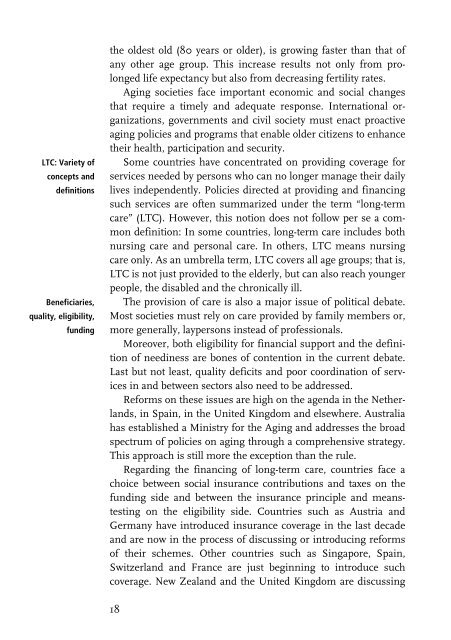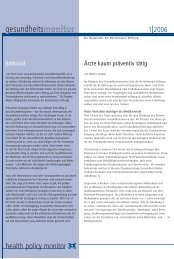The 2nd HPD report - Health Policy Monitor
The 2nd HPD report - Health Policy Monitor
The 2nd HPD report - Health Policy Monitor
- TAGS
- health
- policy
- monitor
- www.hpm.org
Create successful ePaper yourself
Turn your PDF publications into a flip-book with our unique Google optimized e-Paper software.
LTC: Variety of<br />
concepts and<br />
definitions<br />
Beneficiaries,<br />
quality, eligibility,<br />
funding<br />
the oldest old (80 years or older), is growing faster than that of<br />
any other age group. This increase results not only from prolonged<br />
life expectancy but also from decreasing fertility rates.<br />
Aging societies face important economic and social changes<br />
that require a timely and adequate response. International organizations,<br />
governments and civil society must enact proactive<br />
aging policies and programs that enable older citizens to enhance<br />
their health, participation and security.<br />
Some countries have concentrated on providing coverage for<br />
services needed by persons who can no longer manage their daily<br />
lives independently. Policies directed at providing and financing<br />
such services are often summarized under the term “long-term<br />
care” (LTC). However, this notion does not follow per se a common<br />
definition: In some countries, long-term care includes both<br />
nursing care and personal care. In others, LTC means nursing<br />
care only. As an umbrella term, LTC covers all age groups; that is,<br />
LTC is not just provided to the elderly, but can also reach younger<br />
people, the disabled and the chronically ill.<br />
<strong>The</strong> provision of care is also a major issue of political debate.<br />
Most societies must rely on care provided by family members or,<br />
more generally, laypersons instead of professionals.<br />
Moreover, both eligibility for financial support and the definition<br />
of neediness are bones of contention in the current debate.<br />
Last but not least, quality deficits and poor coordination of services<br />
in and between sectors also need to be addressed.<br />
Reforms on these issues are high on the agenda in the Netherlands,<br />
in Spain, in the United Kingdom and elsewhere. Australia<br />
has established a Ministry for the Aging and addresses the broad<br />
spectrum of policies on aging through a comprehensive strategy.<br />
This approach is still more the exception than the rule.<br />
Regarding the financing of long-term care, countries face a<br />
choice between social insurance contributions and taxes on the<br />
funding side and between the insurance principle and meanstesting<br />
on the eligibility side. Countries such as Austria and<br />
Germany have introduced insurance coverage in the last decade<br />
and are now in the process of discussing or introducing reforms<br />
of their schemes. Other countries such as Singapore, Spain,<br />
Switzerland and France are just beginning to introduce such<br />
coverage. New Zealand and the United Kingdom are discussing<br />
18






